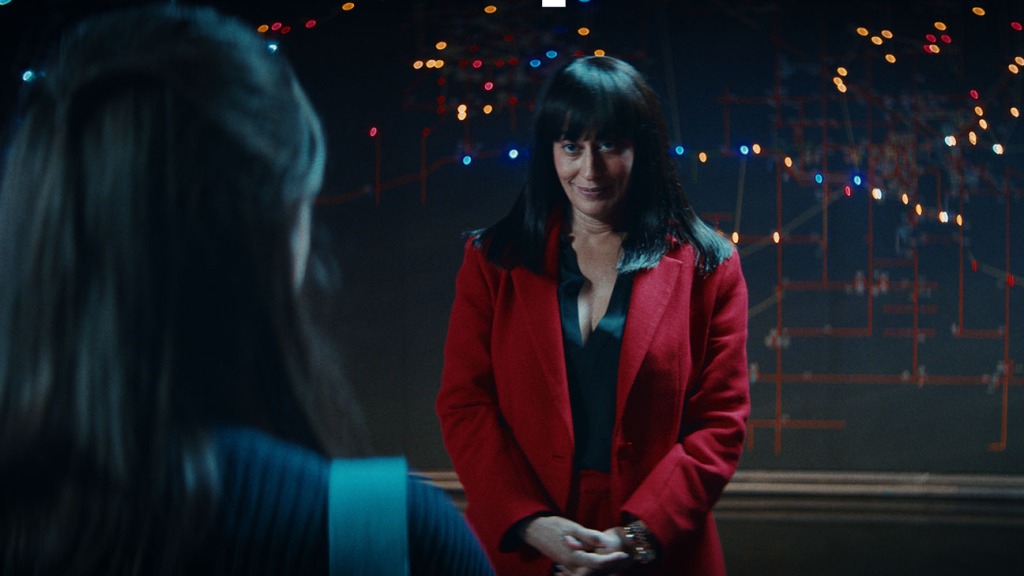
In its broad outlines, Cold Copy is extremely topical. “Journalism isn’t a vocation,” Tracee Ellis Ross says in the opening scene, as high-powered television interviewer Diane Heger. “It’s a persona. It has to be.” She isn’t necessarily wrong. Look at some recent examples, such as Tucker Carlson’s leaked text messages disparaging his supposed hero Donald Trump, and it’s easy to see how Roxine Helberg’s first feature might touch a nerve. Her screenplay is fascinating in the themes it lays out at the start. The film has vivid performances from Ross, Bel Powley as Diane’s student, Mia Scott, and Jacob Tremblay as the subject and ultimately victim of Mia’s shoddy journalism. But Cold Copy is also exasperating in its lack of focus and in its missed opportunities.
Mia, a graduate student taking Diane’s class at an unnamed university, is the film’s focus, and at first she is a study in naïveté. We see who Diane is long before Mia does. She is sarcastic and abrasive with her students, hard on them possibly because they have to be tough to survive professionally. In a fierce performance, Ross doesn’t soften the character’s edges.
Cold Copy
The Bottom Line
Fascinating subject, scattershot results.
Powley conveys a wide-eyed intensity, as Mia makes some childish moves. She yells at Diane when she thinks she won’t be admitted to her class (improbably, that works), and confronts her when her roommate, Kim (Nesta Cooper), gets an internship on Diane’s show, angrily asking, “Why her?” For all her naïveté, though, Mia is also ruthless, revealing Kim’s confidential source to undermine her. It’s hard to know whether she was always ready to compromise on ethics or learned by watching Diane, whose approach is to make subjects squirm to get on-screen reactions, even if she’s trading in incendiary rumors. As the story wavers between a possible loss-of-innocence plot and one about dark tendencies that come to the surface, Mia seems like a muddled, fuzzily written character. Powley can’t overcome that.
As Igor Nowak, an adolescent who agrees to be the subject of Mia’s class assignment, Tremblay displays what a true talent he is. His role is secondary to the two stars’, but his character is the most nuanced, his performance beautifully enigmatic. At times Igor seems savvier than Mia about journalism, skeptical about her intentions. His mother was a famous children’s book writer, whose death years before put an unwelcome media glare on the family. But he is also vulnerable enough to eventually trust her.
Trusting her is a big mistake we can see coming, and as Mia puts together a story about the secret of Igor’s mother’s death, the film begins to go off the rails. Desperate to get a story, Mia surreptitiously uses Igor’s house keys, moves objects around to fake an explosive visual, and photographs a private letter to use in her piece. Fiction doesn’t have to get journalism right, but Cold Copy crosses the line between unrealistic and absurd. Never mind the unethical invasion of privacy. When Mia trespasses into the house, you have to ask, “Has she never seen an episode of Law & Order?”
Diane’s actions become ridiculous, too. She invites Mia out for a drink to push her to depict Igor in her report as a troubled youth. “If you act like Igor is fine, he’ll look fine,” Diane says. And if he’s okay, “where’s the story?” The disregard for truth is meant to be the point, but a smaller issue is very distracting here. Taking her student for a drink? Has she never had to take an HR anti-harassment course like everyone else who works at an American institution? That drink is presented as an occurrence no one would blink at, not transgressive on Diane’s part, and it’s one of many tiny missteps that amount to an increasingly unbelievable story.
Visually, the film is as straightforward and unremarkable as an ordinary news report. But at its best, it has some galvanizing moments that reveal how much it might have said about the media and that suggest Helberg’s genuine promise as a director. A sharply shot and edited flashback montage shows Igor, Mia and Kim dancing in Mia’s apartment, deftly filling us in on an innocent night that has brutal repercussions. Mia’s report is a pitch-perfect clone of a tacky, exploitative news story masquerading as something more earnest and high-minded. And Helberg constructs a well-played, killer ending. But ultimately, the film is less about the ostensible themes of journalism and truth that it starts with than an erratic drama about two out-of-control compromised people, anomalies who deserve each other.













